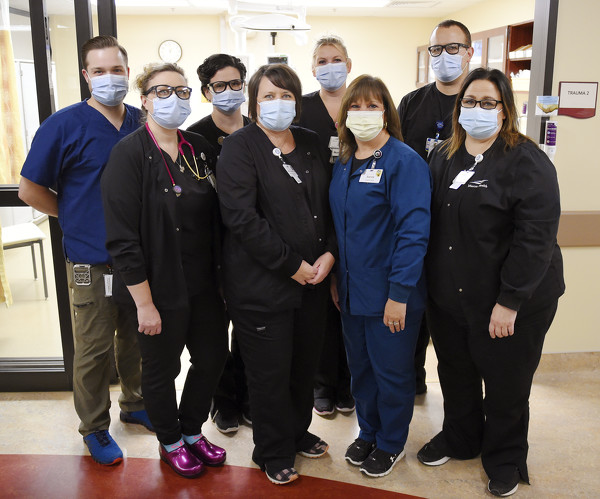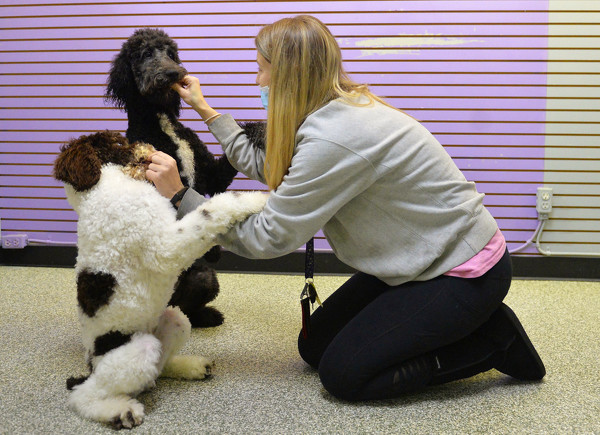Monday, November 30th, 2020
Area health care workers under enormous stress
By Sydney Albert

Photo by Dan Melograna/The Daily Standard
Members of the Mercer County Community Hospital Emergency Department wear masks. The COVID-19 pandemic has been especially stressful for health care workers.
Many people have felt the effects of increased stress and changes to everyday life since the the onset of the pandemic, but few have been affected so acutely as health care workers as the number of COVID-19 cases continue to climb.
Mercer and Auglaize counties have seen a sharp increase in the number of COVID-19 cases recently. With more people seeking medical care for the virus, as well as more typical injuries or seasonal ailments, hospitals across the state of Ohio have been keeping busy - and medical staff continue to plead with their communities to take the virus seriously.
"Stressful" was a common descriptor used by local health care workers to describe their experience during the pandemic. They've had to deal with sudden changes to their workflow, have needed to accommodate and comfort patients and families who aren't able to see one another and have picked up the work of colleagues who've been forced to self-isolate due to the virus.
Margo Chappell, a patient access manager for Mercer Health, said that while her staff has been amazing at rolling with the punches, at times there were so many changes within a single shift that it was hard to ensure her staff were up to date on rules and regulations.
Kimberly Reinhard, director of inpatient services for Mercer Health, said staff had to handle constant changes to the required processes they needed to do, personal protective equipment they needed to wear, medications to be given and patient care. She, too, noted workers were continuing to give their all, but that the entire experience was wearing people down.
"The constant possibility of taking care of COVID-19 patients and potentially bringing it home to loved ones is very stressful. Caring for an increased number of patients is stressful. Not knowing what your shift is going to be like on the COVID-19 unit is stressful. Not getting around to patient rooms fast enough due to everyone being in isolation is stressful. Having to notify families that their loved one is doing well with COVID-19 is stressful. All of this adds up to increased burnout for staff," Reinhard said.
According to Reinhard, Mercer Health saw the first COVID-19 positive inpatient at the end of April. Since then, there have been highs and lows regarding the number of COVID-19 patients, but for the past two months there has been an "unprecedented number of sustained patients" in the inpatient unit.
To limit potential spread within the hospital, COVID-19 patients are placed in a separate unit and medical staff must ensure they put on an isolation gown, gloves, eye protection and an N95 mask before entering a patient's room. When leaving, they must remove all PPE to ensure they don't contaminate themselves or others. The process is time consuming, especially when it must be done for every patient, and adds a great deal to staff workload, Reinhard said.
Workers have also, at times, had to deal with frustrated patients or family members.
Recently, staff at Doctor's Urgent Care in Celina had reportedly needed to deal with a man who became "verbally aggressive" over wearing a mask on the property. According to a report from Mercer Health's Regulatory Readiness Committee, a minor's father had come to the Urgent Care facility seeking treatment for his son and became aggressive with staff "because he was upset about wearing a mask."
More staff had reportedly approached the registration window to assist as they heard the incident escalate. The staff was about to push the panic button when the man finally calmed down and wore a mask in the waiting room.
Chappell said most patients and visitors follow rules set by the hospital regarding masks and social distancing, and those that don't are in the minority. However, members of her staff handle the phone switchboard for Mercer Health, she noted, and have reportedly seen an increase in frustrated patients.
The pandemic and the measures that have followed have been hard on everyone, Chris Albers said. Patients can get lonely and scared at times - even depressed, if their stay is extended - and family members can become aggravated.
Staff could be working in isolation rooms and unable to immediately take calls from family members seeking an update, feeding the frustration, but constant interruptions due to phone calls can also take a toll on staff, Albers said.
Many workers have missed big events trying to follow pandemic guidelines, or to keep themselves, their families, their coworkers or their patients safe. They have had to avoid large gatherings, such as weddings and graduation parties, or said they have limited contact with families due to the potential risks they pose.
As the number of cases rises locally, the chances of contracting COVID-19 due to community spread have also risen. For health care workers, this poses a problem - medical staff whose daily work requires them to be with patients cannot do all of their work from home, and their coworkers must come together to bear the load.
The hospital has been diligent in following policies established by the Centers for Disease Control and the Ohio Department of Health, according to Reinhard. Still, multiple employees have been off due to isolation or quarantine, and it's difficult to replace them when they're gone for 10-14 days at a time.
"My staff have put in extra hours and continue to work extra to care for the multitude of patients that are filling up our unit," Reinhard said.
"I hear staff and the community talk of weddings, funerals and get togethers where nobody wore a mask. Typically we see the repercussions of this a couple days later when an employee comes down with potential symptoms or has to quarantine, because they have been around a family member that is now positive. This is frustrating, because it causes extra work for myself and staff to replace this person. Nursing is a specialized skill set and isn't quickly or easily replaced," she said.
Accounts from doctors and nurses elsewhere in the country have mentioned patients who denounced the coronavirus as a hoax, even as they were being treated in hospitals for complications due to the virus.
"I have not had anyone say to my face it is a hoax. I see the strain in my nurses' and techs' faces every day that prove to me this is real and isn't going away. It is not political or a conspiracy theory," Reinhard replied when asked if she'd experienced something similar.
Albers expressed the community needed to work harder to prevent the spread of COVID-19, asking that people wear masks, wash their hands, avoid big crowds and stand six feet apart.
"Please take this virus serious, it is real. Just be there for your families (and the) Mercer Health staff," he said.
Reinhard said she is diligent about wearing her mask when she knows she's coming into contact with people in close quarters, and would hope that the community would do the same. However, that doesn't seem to be happening, she said.


